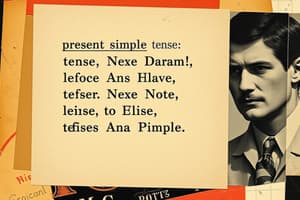Podcast
Questions and Answers
在现在简单时态的否定形式中,通常会在动词后面使用什么词?
在现在简单时态的否定形式中,通常会在动词后面使用什么词?
- not (correct)
- will
- often
- to
以下哪个是用于现在简单时态否定形式的正确形式?
以下哪个是用于现在简单时态否定形式的正确形式?
- She don't drive (correct)
- I am not study
- You doesn't play
- They not watch TV
在现在简单时态疑问形式中,哪个词会放在动词前面?
在现在简单时态疑问形式中,哪个词会放在动词前面?
- do (correct)
- can
- often
- not
完整的现在简单时态疑问句应该是由哪些部分组成?
完整的现在简单时态疑问句应该是由哪些部分组成?
以下哪个选项包含了现在简单时态的正确否定形式?
以下哪个选项包含了现在简单时态的正确否定形式?
根据文本,Microsoft Bing Chat的“No Search”功能允许用户做什么?
根据文本,Microsoft Bing Chat的“No Search”功能允许用户做什么?
为了加强对现在时态中否定和疑问形式的理解,以下哪项练习是有益的?
为了加强对现在时态中否定和疑问形式的理解,以下哪项练习是有益的?
使用Microsoft Bing的“No Search”功能进行练习时,用户需要怎样操作?
使用Microsoft Bing的“No Search”功能进行练习时,用户需要怎样操作?
如何提高英语交流能力中现在时态的否定和疑问形式?
如何提高英语交流能力中现在时态的否定和疑问形式?
为什么对于英语有效交流,掌握现在时态及其否定和疑问形式至关重要?
为什么对于英语有效交流,掌握现在时态及其否定和疑问形式至关重要?
Flashcards are hidden until you start studying
Study Notes
Present Simple Tense: Navigating Negative and Interrogative Forms
The present simple tense is a fundamental aspect of English grammar, expressing regular actions and events that occur without time specification. In this article, we'll focus on two specific forms of the present simple tense: negative and interrogative constructions.
Negative Forms
Negative forms of the present simple tense typically use the word "not" after the verb or an auxiliary verb plus "not."
-
Base form + not For example, "I don't study for exams" uses the base form of "study" followed by "not."
-
Auxiliary verb + not For instance, "I don't usually listen to music" uses the auxiliary verb "listen" in its present simple tense form followed by "not."
Negative forms in the present simple tense help us express absences, exclusions, or actions that we don't do regularly.
Interrogative Forms
Interrogative forms are used when we want to ask questions about the present simple tense.
-
Base form + question word For example, "Do you read a book every day?" uses the base form of "read" followed by the question word "do."
-
Auxiliary verb + base form + question word For example, "Do you usually listen to music?" uses the auxiliary verb "listen" in its present simple tense form followed by the base form of "listen" and the question word "do."
Interrogative forms in the present simple tense enable us to engage in conversation by asking questions about the present.
A Notable Feature: Microsoft Bing's No-Search Option
In recent news, Microsoft Bing Chat has introduced a feature called "No Search." This feature allows users to prevent Bing from searching the web for answers. Users can add "#nosearch" at the end of their messages to the chatbot, effectively disabling its web search capabilities. This feature can be beneficial in situations where users want to focus on the chatbot's computational capabilities rather than receiving information from the web.
Practice Tips
To strengthen your understanding of negative and interrogative forms in the present simple tense, try the following exercises:
- Identify negative and interrogative forms in sentences from everyday conversations and texts.
- Practice forming negative and interrogative sentences in the present simple tense.
- Use tools like Microsoft Bing's No Search feature to practice communicating without web search results.
- Engage in conversations with friends or family members, using negative and interrogative forms in the present simple tense.
Remember, a strong grasp of the present simple tense and its negative and interrogative forms is crucial to effective communication in English.
Studying That Suits You
Use AI to generate personalized quizzes and flashcards to suit your learning preferences.




